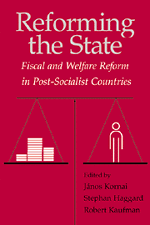Book contents
- Frontmatter
- Contents
- List of Tables and Figures
- List of Contributors
- Preface
- Introduction
- Part I Fiscal Policy and Institutions
- 1 The Politics of Labor-Market Adjustment: The Case of Russia
- 2 Creating Effective Tax Administrations: The Experience of Russia and Georgia
- 3 Politics, Institutions, and Macroeconomic Adjustment: Hungarian Fiscal Policy Making in Comparative Perspective
- 4 Brothers-in-Arms or Rivals in Politics? Top Politicians and Top Policy Makers in the Hungarian Transformation
- Part II The Welfare State
- Appendix
- Index
2 - Creating Effective Tax Administrations: The Experience of Russia and Georgia
Published online by Cambridge University Press: 05 June 2012
- Frontmatter
- Contents
- List of Tables and Figures
- List of Contributors
- Preface
- Introduction
- Part I Fiscal Policy and Institutions
- 1 The Politics of Labor-Market Adjustment: The Case of Russia
- 2 Creating Effective Tax Administrations: The Experience of Russia and Georgia
- 3 Politics, Institutions, and Macroeconomic Adjustment: Hungarian Fiscal Policy Making in Comparative Perspective
- 4 Brothers-in-Arms or Rivals in Politics? Top Politicians and Top Policy Makers in the Hungarian Transformation
- Part II The Welfare State
- Appendix
- Index
Summary
During the central-planning period much of the economy was public and the private sector played a very marginal role. The role of the state was all-pervasive. To a large extent the government determined the wages and other incomes (including pensions) of individuals; the allocation of resources to various functions and activities; the investmentconsumption breakdown; the allocation of jobs; and the relative prices and availability of products. The plan was the essential tool that the government used to carry out its economic decisions. Through planning decisions, the government could directly appropriate resources and use them in the ways it deemed desirable. It was difficult and unnecessary to separate an area that could properly be called public finance from private finance.
The transition to a market economy aims at replacing much public ownership with private ownership and many public decisions with private decisions. It thus aims at reducing the role of the state in the economy and at changing the way that role is played. In the new environment, the state must get the resources that it needs by taxing individuals and private-sector activities and, to a much lesser extent, by borrowing; and it must play its role by spending those resources in the most efficient way.
To operate efficiently in market economies, governments need the support of various institutions as well as the implicit support of the taxpayers. Some of these institutions did not exist in centrally planned economies because they were not needed.
- Type
- Chapter
- Information
- Reforming the StateFiscal and Welfare Reform in Post-Socialist Countries, pp. 53 - 74Publisher: Cambridge University PressPrint publication year: 2001
- 6
- Cited by



